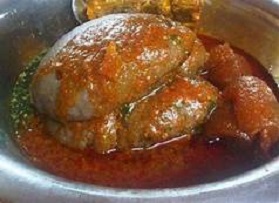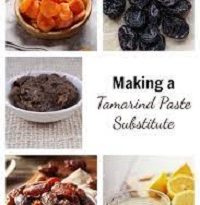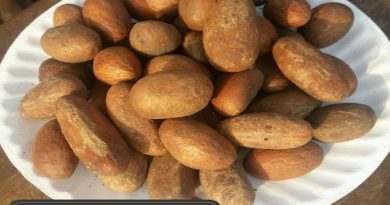Amala Food Recipe | Easy Nigerian Food | Health Benefits
Amala Food Recipe – the only ingredient needed when making this food is boiling water and either one of the two types of flour: yam flour and/or cassava flour.

This popular delicacy is made from either yam flour or cassava flour. The recipe is lightweight and makes for an easy swallow and weight loss.
Related >>> Amala Food: How to Prepare Amala (Dark Brown Yam Flour)
Everybody in Nigeria knows about amala food and they all love it.
For those who do not like amala food, the reason is simple: they have not yet tasted it (Amala and Ewedu with stew is equal to none!)
Tasting is all it takes to fall in love with this Yoruba traditional delicacy
It’s difficult to visit any of the local bukas in large cities like Lagos and Ibadan without seeing the meal on the menu.
Table of Contents
Amala Food Recipe: Types of Amala
Amala is of three types: àmàlà isu, àmàlà láfún and “amala ogede”
- Yam flour (àmàlà isu)
This is the most popular type of àmàlà and is derived from yam.
- Cassava flour (àmàlà láfún)
The type is made from cassava flour. Dried cassava flour is known as “lafun” in Nigeria and “kokente” in Ghana.
- Plantain flour (Amala ogee)
This type of Amala is made from plantain, clubs ogee (which is usually lighter in color).
The low carbohydrate level in plantain flour makes it a perfect diet for people diagnosed with diabetes and others who need low-carbohydrate food.
Amala Food Nutritional Values: Calories, Nutrition Facts/Information
Nigerian Amala has the following important nutrients-Carbohydrate, Calcium, Dietary fiber, Copper, Magnesium, Potassium, and Vitamins.
It is a rich source of carbohydrates because yam is an important source of carbohydrates for many people in the Sub-Saharan region particularly in the yam zone of West Africa.
Checkout >>> Amala Food Nutritional Values | Health Benefits | Health Risks
Health Benefits of Amala Food
The Health Benefits of Amala Food are many and they include:
- Amala food’s nutritional values help to build your body formation and keep the body intact and also to fight bacterial and viral diseases.
- Secondly, it helps with weight loss. The fiber content in Amala helps to flush out toxins from the body making you feel light after eating this food.
- Vitamin A helps with good eyesight, and brain formation, and also lowers inflammations.
- Amala regulates the body’s blood formation, stops blood clotting, and stabilizes your blood pressure.
- Consumption of Amala food aids in lowering bad cholesterol due to its high water content and fiber.
- Amala boosts your body’s immunity; lowers the risk of colon cancer, controls diabetes, and nurtures your skin.
- Finally, it offers the body essential minerals, improves hair texture, and aids indigestion.
- The great thing about the Amala Food Recipe is that it is quick and easy to prepare, but then, if you are not careful you may end up with lumps
Amala Food Recipe – 4 Easy Steps on How to Make Àmàlà Flour without Lumps
Here are the 4 simple steps to making a lump-free Amala:
- Firstly, heat water on the fire and allow boiling.
- After that, bring it down from the fire and gradually add your Abebi Yam Flour (Do not add the yam flour to the water while still on the fire so it doesn’t form lumps)
- Thirdly, turn the yam flour with a wooden Eba stick (omorogun) quickly so as not to form lumps.
- Then, add a little water and put it back on the fire to cook on low heat for about 5 minutes.
- Finally, after 5 minutes, begin to turn the Àmàlà again, and keep turning until a smooth paste is formed. Also, the pulling of the dough into a smooth paste is the most difficult part of making Elubo.
Àmàlà can be eaten with various types of soups, which include:
- Okro soup
- Efo riro: this is made from vegetables and a mixture of meat, fish, etc.
- Ogbono Soup
- Gbegiri soup: this is made from dried beans.
- Egusi Soup:
- Amala and Ewedu: this is made from cooked and grated corchorus olitorius leaves with/without a small number of locust beans.
Amala Food Swallow: Health Benefits
Amala is a traditional Nigerian food made from yam flour. While it’s a staple dish in Nigeria, it’s not commonly known outside of West Africa. Here are some potential health benefits of Amala:
Good Source of Carbohydrates
Amala is primarily made from yam flour, which is rich in carbohydrates. Carbohydrates are the body’s primary source of energy, providing fuel for various bodily functions and physical activities.
Dietary Fiber
Yam flour used in making Amala contains dietary fiber, which aids in digestion, promotes bowel regularity, and helps prevent constipation.
A diet high in fiber is associated with a lower risk of various digestive disorders and may contribute to overall gut health.
Vitamins and Minerals
Yam, the main ingredient in Amala, is rich in various vitamins and minerals, including vitamin C, vitamin B6, potassium, manganese, and dietary antioxidants. These nutrients play essential roles in maintaining overall health, supporting immune function, and reducing the risk of chronic diseases.
Gluten-Free
Like many traditional African dishes, amala is naturally gluten-free, making it suitable for individuals with celiac disease or gluten intolerance.
Satiety
The combination of carbohydrates and dietary fiber in Amala can contribute to a feeling of fullness and satiety, which may help control appetite and support weight management when consumed as part of a balanced diet.
Low in Fat
Amala itself is low in fat, which can be beneficial for those aiming to reduce their fat intake or manage their weight.
Cultural Significance
While not a direct health benefit, the cultural significance of Amala should also be acknowledged.
Traditional foods like amala often hold cultural and social importance, promoting a sense of community and connection to cultural heritage.
It’s worth noting that the health benefits of amala can vary depending on factors such as portion size, cooking methods, and the ingredients used in accompanying soups or stews.
As with any food, enjoying amala as part of a balanced diet alongside a variety of other nutrient-rich foods is key to reaping its potential health benefits.
Eat Amala Food and Live Healthy


